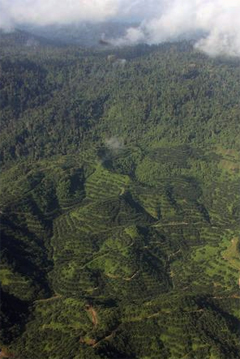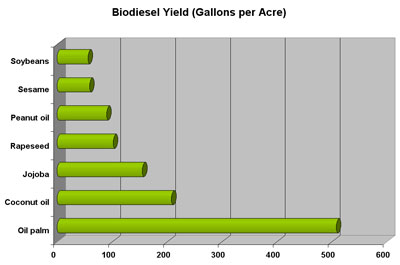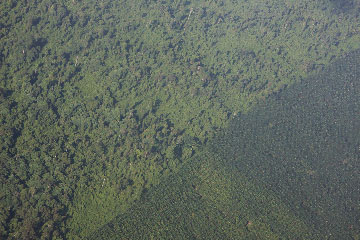Biodiversity of rainforests should not be compared with oil palm plantations says palm oil council chief
mongabay.com, November 11, 2008
Dr. Yusof Basiron, the controversial CEO of the Malaysian Palm Oil Council (MPOC), blogs about the sustainability of palm oil.
Scientists should compare the biodiversity oil palm plantations to other industrial monocultures, not the rainforests they replace, said Dr. Yusof Basiron, CEO of the Malaysian Palm Oil Council (MPOC), in a post on his blog.
"I would also like to encourage environmental scientists not to compare the biodiversity of an agricultural crop such as the oil palm with that of rain forests," he wrote. "The findings would not win you a Nobel price."
"If a comparison is to be made, the biodiversity of the oil palm, an agricultural crop, should be compared with that for soyabean or rapeseed, corn or sugarcane or other agricultural crops," he continued. "Biodiversity that exists in the oil palm plantations is a bonus for all to benefit, while we enjoy the supply of oil for our food need, in addition to palm oil — an agricultural commodity — helping to promote economic growth not only in the developing countries but also in all other countries involved in using the product."
Oil palm plantations and logged over forest in Malaysian Borneo. While much of the forest land converted for oil palm plantations in Malaysia has been logged or otherwise been zoned for logging, expansion at the expense of natural and protected forest does occur in the country. Reserve lines are sometimes redrawn to facilitate logging and conversion to plantations.
Basiron's comments are noteworthy because until now he has maintained that oil palm plantations are "planted forests" rather than an industrial crop. Oil palm plantations are indeed biologically impoverished relative to even heavily logged forests — a study published earlier this year showed that oil palm plantations retain less than one-sixth the biodiversity of old growth forests and less than a quarter of that in secondary forests. However when compared with soy or rapeseed farms, which support almost no wildlife, oil palm plantations look a little less like biological deserts. Small measures — like maintaining and restoring forest cover along waterways, conserving peatlands and high value conservation areas, and reducing the use of fertilizers and pesticides — can help augment the biodiversity of existing plantations.
Basiron also noted that oil palm is the highest yielding conventional oilseed on the market — far outstripping the production per unit of area for rapeseed and soy. While its high yield makes oil palm exceedingly profitable — especially during the recent boom in palm oil prices, which recently ended, coinciding with falling oil prices — it also theoretically means that less land needs to be converted to produce the same amount of oil had the land been cultivated with other crops. The problem, say environmentalists, stems from the practice of clearing natural forest for oil palm plantations, which reduces biodiversity, hurts ecosystem functioning, and results in greenhouse gas emissions. While Basiron and the MPOC have flatly denied that natural forest has been cleared for the establishment of oil palm plantations, ground and satellite evidence proves the claims quite false. Nevertheless there are opportunities to covert degraded and abandoned agricultural lands for oil palm, mostly in Indonesia, rather than Malaysia where most land is already under cultivation or forested. While returns would be lower without the "logging subsidy" generated by selling the timber harvested from forest land prior to planting with oil palm, such plantations would face less criticism from the environmental community.
A third point made by Basiron is that Malaysia is a sovereign nation that has same rights to develop its economy as industrialized nations have had. The same concept has been put forth by Brazil over deforestation of the Amazon and China with regards to its rising greenhouse gas emissions.
Basiron writes, "It is also unethical, immoral and somewhat patronizing for NGOs of the developed countries in Europe to ask developing countries such as Malaysia to stop developing its land. Asking Malaysia to stop developing its land will lead to conflicts and misunderstanding because some states in Malaysia have not yet had the opportunity to develop their agricultural land as they were until a few decades ago under oppressive colonial rule."
"Sarawak [a state on the island of Borneo] which achieved independence from the British later than Peninsular Malaysia had only developed 8% of its land for agriculture compared to the UK which has over 70% of its land under agriculture. But there are still opportunities in Sarawak and other parts of Malaysia to develop degraded logged over land for planting rubber and oil palm to increase the country's sources of foreign exchange while not involving the deforestation of the pristine permanent forests."
Oil palm plantations near Lahad Datu, Malaysia. Photo by Rhett A. Butler
While Basiron's comments will likely be dismissed or ignored by many environmental groups, his points are not the sort that typically provoke outcry from the green lobby. MPOC lands in the most trouble with the environmental community when it attempts to deliberately mislead the marketplace on the environmental performance of palm oil, an approach the group has used repeatedly in recent years with advertising campaigns, "greenwashing" and "astroturfing" techniques, and other propaganda. Of course MPOC is not alone in using these tactics — it follows the model employed widely by industries ranging from U.S. ethanol producers to big oil. The problem for MPOC — and other industries — is that misleading campaigns are only providing more fodder for its enemies. But MPOC is hedging itself. The palm oil marketing group is also employing a second strategy that may pay better dividends in the long run — an effort to improve the environmental performance of palm oil. While the initiative — known as the Roundtable on Sustainable Palm Oil (RSPO) — has stumbled a bit coming out of the blocks, it appears there may be a market for certified palm oil, which would offer producers a premium for mitigating the environmental impacts of producing the vegetable oil. The first RSPO-certified palm oil is expected the reach Europe today. Unilever, one of the world's largest consumers of palm oil, has already pledged to buy only certified palm oil by 2015.













No comments:
Post a Comment